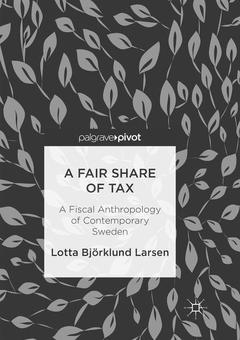Description
A Fair Share of Tax, 1st ed. 2018
A Fiscal Anthropology of Contemporary Sweden
Author: Björklund Larsen Lotta
Language: English
Subjects for A Fair Share of Tax:
Approximative price 29.54 €
In Print (Delivery period: 15 days).
Add to cartPublication date: 06-2019
136 p. · 14.8x21 cm · Paperback
Approximative price 29.54 €
In Print (Delivery period: 15 days).
Add to cartPublication date: 01-2018
Support: Print on demand
Description
/li>Contents
/li>Biography
/li>Comment
/li>
Preface
1 Exchanges create relations
Defining taxation
Reciprocity
Why Sweden?
Understanding the relation between society and tax
Fieldwork: Ethnography of Swedes' views on taxation
Research on why we pay tax
Anthropology of economic exchanges and reciprocity
Reciprocity proliferating
To see tax as a gift - or?
Conclusion
Literature
2 Taxpayers’ relation to their state
Taxes in terms of reciprocity cannot be measured
The Agency’s view on why taxpayers comply
Fairness in tax collection
Who is the taxpayer?
A contemporary view of taxpayers at the Agency
Getting value for ‘tax’ money
Unfairly treated by society
Balancing a fair deal with the state
Conclusion
Literature
3. Taxpayer to taxpayer relation
The Agency's view
Barter
Taxpayer views on barter
Business and private life
An example: Horse trotting
Business and private life continued
Informalizing the formal
Formalizing the informal: Share economy
Conclusion
Literature
4. Tensions between paying and receiving
Being Magister
Progressive marginal tax
Pillars of society
Balance artists
Contributive and distributive balancing
Not paying for those who do not pay
A fair society
Conclusion
Literature
5. Making tax compliant
Taxation is a total social phenomenon
Balance outstanding
Fair share – all need to contribute
Literature
- A fresh and necessary outlook at tax compliance issues from an economic anthropology perspective
- Stresses reciprocity is to be taken seriously in tax compliance
- Explains reciprocal relations based on what taxpayers and tax practitioners actually do




